Peter MALONE
Saturday, 18 September 2021 19:50
Any Number Can Play

ANY NUMBER CAN PLAY
Yours, 1949, 96 minutes, Black and white.
Clark Gable, Alexis Smith, Audrey Totter, Wendell Corey, Barry Sullivan, Edgar Buchanan, Margery Rambaugh, Frank Morgan, Mary Astor, Richard Rober, Darryl Hickman, William Conrad, Leon Ames.
Directed by Mervyn Le Roy.
Any Number Can Play is a story about gambling. It is a star vehicle for Clark Gable as he began to build his career after World War II and his previous success. In many ways he is certain 20th-century Rhett Butler in this film, longtime married to his wife, Alexis Smith, worried about relationship with his son, Darryl Hickman, getting a bad diagnosis of his health from his doctor, Leon Ames. He has been in partnership fifteen years with friends in the casino.
The film shows life at the casino, a range of clients including Frank Morgan, Mary Astor, Margery Rambaugh. Audrey Totter is his sister-in-law and her husband, Wendell Corey, is a weak character who works at the casino and is threatened by two mobsters, Richard Rober and William Conrad.
The film has high-class MGM production values and was directed by Mervyn Le Roy who had began at Warner Brothers was gangster films and moved to MGM for more plush dramas.
1. An old-style MGM drama from the 1940s? Story, style, production values, cast?
2. Clark Gable at this point of his career? His post-war performances? The type of character? 1940s Rhett Butler style character, gambling, charity, relationship with his wife, wanting the love of his son?
3. Black and white photography, production, homes, the casino, the streets? The musical score?
4. The Casino story, Charlie, his partners, 15 years of success, their characters, collaboration with Charlie, friendship? The importance of Clayey as part of this group? His service of 15 years? The range of clients, concerns about Charlie’s health? Financial questions?
5. Charlie at home, his relationship with Lon, the distance between them, mutual love, Paul, his age, rebellion? Charlie puzzled about his son’s behaviour?
6. The doctor coming to the Casino, the diagnosis of angina, discussion with Charlie? Going to the home, the discussions with Lon?
7. Robbin and Alice, Alice as Lon’s sister, the touch of jealousy and her attraction to Charlie? Robin as weak, unwell, his work at the Casino, stealing small amounts, owing money, gambling? The gangsters, coming to the house, the talk, the threats, going to the Casino, the loaded dice, Robin and his fixing the throw? Charlie knowing the truth?
8. The range of clients, Jim and his brash style, his money, wanting to win, the challenge to Charlie, the underlying dislike, his big success in winning, the people watching? His decision whether to stop or continue? Charlie, coming, playing, the need for cash, the concerns, Jim and his losing?
9. Ben, his visits Charlie, his sad story, sponging on Charlie, Charlie nice, giving him the loan, the poker game, his losing, suicidal, the attempt, not killing himself, a sense of failure?
10. Sarah Calbern, the Dowager, tough, her friendship with Charlie and the owners, meeting Paul, prepared to make the phone call to her lawyer to get money and cash for Charlie?
11. Ada, her marriages, love for Charlie, the visit to the office, wanting him to leave, his not going?
12. Lon, the years of marriage, love, the distance, a concerned, discussions with Alice? Paul, going to the dance? Going to the prison, the bail? Going to the Casino, pleading with Charlie to leave, watching the game with Jim?
13. Paul, his age, bullying at school, his relationship with his father, not liking his father’s reputation, arguing with him? Going to the dance, the friends asking about his father, the fight, in jail? The owner and his speaking well to Charlie, Charlie proud that Paul was involved in the fight?
14. The gangsters, going to the home, the threats, the loaded dice? The decision to hold up the Casino, their bluff, Charlie confronting them, overcoming, shrewd, the fight, Paul and his involvement, the gangsters ousted?
15. The card game, the onus picking the card to see whether they would own it when Charlie left, Charlie and his deceiving them because he had the higher card?
16. The Casino prospering and the family going to health and happiness?
Published in Movie Reviews
Published in
Movie Reviews
Tagged under
Saturday, 18 September 2021 19:50
Lyonnais, Les
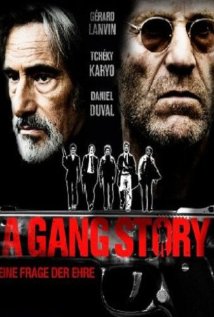
LES LYONNAIS
France, 2011, 102 minutes, Colour.
Gerard Lanvin, Tcheky Karyo.
Directed by Oliver Marchal.
Les Lyonnais is a French gangster film. the film is based on actual events, two young men who were friends, one gypsy, one local, who were arrested for stealing cherries. As they grew older, they became involved in complex organised crime and robberies, in the 1960s and 1970s.
Time has passed and the gypsy, who has established an empire, has a family, wants to forget the past. However, the other friend has surfaced, and a confrontation builds up between the two, revelations that the friend has been a traitor, and the gypsy organising his elimination.
Gerard Lanvin and Tcheky Karyo are strong French actors and carry this film. The director has built something of a career on police and criminal films and television series.
1. An interesting French crime thriller? Based on true stories? 21st century style and storytelling?
2. The French settings, in the past, in the present? Homes, prisons, the streets?
3. The title, the name for the gang?
4. The structure of the film, the present, memories, flashbacks? The friends in the young days? In the present?
5. The focus on Momon, his age, experience, with his family, the mansion, yet the guards? His wife, children and grandchildren? His being disturbed, his friend in prison, the plan for him to be abducted from prison?
6. Serge, his work as a gangster, the partnership the 35 years, his visit with his wife, the arrest, imprisonment, interrogations, torture? His reliance on Momon?
7. The flashbacks, the two men when they were young, social conditions, the robberies, the cherries? Their being apprehended? In prison, interrogated, searched, the experience, their bonding?
8. The 35 years, Serge and his not being found? The importance for Momon?
9. The set up, the gang, the guns, the police, the rescue?
10. Momon and his henchmen, characters, work, violence, loyalty?
11. The past and the two men as adults, forming the gang, the series of robberies, the frustration of the police? Momon and his love, his wife? Her being interrogated, prison, the effect? The arrest and imprisonment?
12. The truth, Serge and his being an informant? Betrayal? Momon and his feelings of loyalty? Arranging the killing?
13. The meeting, the confrontation, the resolution?
14. An interesting French film, crime history, the status of the characters, crime and paying?
Published in Movie Reviews
Published in
Movie Reviews
Tagged under
Saturday, 18 September 2021 19:50
Settling of the Sun, The
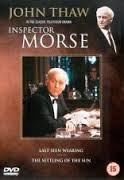
MORSE: THE SETTLING OF THE SUN
UK, 1988, 100 minutes, Colour.
John Thaw, Kevin Whateley, Anna Calder- Marshall, Robert Stephens, Derek Fowlds, Avis Bunnage.
Directed by Peter Hammond.
The Settling of the Sun is one of the earliest of the Inspector Morse telemovies. It has a very interesting subject, the death of a Japanese at an Oxford University, the discovery that he was the son of a torturer during world War two and that he was dealing in drugs.
The film opens with an Oxford minister who was tortured by the Japanese, is cared for by his daughter (Anna Calder Marshall). She works at the University and has an assistant who worked as a nurse during the fall of Singapore (Avis Bunnage). Robert Stephens appears as the head of the University, a military man, intent on the reputation and finances of his college, clashing with Inspector Morse.
The screenplay, as always, has a complex plot, is in the early stages of establishing Morse as a character, rather morose, interested in music, in his beer, and giving Inspector Lewis a hard time.
The theme of settling memories of Japanese torture and World War II makes this a particularly interesting film.
1. The title? It’s ambiguity? The setting of the sun? The Japanese references? War crimes? Vengeance?
2. The popularity of the long-running series? Television movies? With style? The popularity of Morse and his personality, enigmatic and mannered style? The personality of Lewis? Their relationship? The solving of the crimes? Intricacy of the plot? The psychological dimensions, the mystery and clues? Police work and solving the mysteries with their own abilities? The work of Colin Dexter?
3. The Oxford settings, the city and landscapes, the cityscapes, the buildings? Comments about Oxford and Oxford society? The ironies about Oxford and the dons? The university city? Ordinary people? Their interconnections? So much beauty – and so much crime?
4. The quality of the mysteries, character-driven? Sufficient information, sufficient clues? The exploration of character and clues?
5. John Thaw as Morse, his personality, the changes over the years, yet remaining the same? The mystery of his name? His crusty manner, the bachelor (but romantic at times)? His own authority – exercised over Lewis – and his reaction to authorities? Promotion or not? The changing of his attitudes towards Lewis, bossing him, patronising him about education and culture? The issue of music? Drinking ale? His car? Quietly at home, at work? With Lewis, understanding the situations and characters, the deductions? His being a good listener – but critical?
6. The contrast with Lewis, the family man, the ordinary policeman, education and lack of education, his being put down by Morse – but enjoying his comeuppance now and again? Music and his ignorance? The first reactions, Lewis being patient? His admiration for Morse, having to do so much leg work, to formulate hypotheses? Working under pressure? Collaborator and partner of Morse?
7. The police authorities in Oxford? The medical examiners – and Morse and his attitude towards the female authorities? Sexist and patronising? Changing?
8. The quality of the film as a crime thriller, a thriller with intelligence and demands on the audience?
9. The introduction to the crime, the credits, the background in Oxford, beyond?
10. The range of personalities, motives? Truth and concealment? Jealousies? Deceits and angers? The academic and religious backgrounds?
11. The students coming to the Oxford College, International, the crossword puzzle, the variety of nations, the Japanese member, out of the bus, the organisation, Miss Robson and her being in charge? Sir Wilfred and the University, regretting having to taking students? The meal? The exit of the Japanese not feeling well? The top table? Morse and the invitation for him to be present, to present the prize for the crossword? The introduction to him, as a person, interest in crosswords, music? Sir Wilfrid and his speech, the interruptions?
12. The discovery of the body, crucified, the words? Identification of the body? The later complications about the dead man? The frame up for his being a drug dealer? The irony that he actually was? The revelation that his father was the torturer of the Rev Robson? The plot, the substitute, the revelation that the Japanese overcame the substitute, and killed him?
13. The Rev Robson, the introduction to the story, his age, tortured by the Japanese, unable to speak, the wounds in his hands? The love of his daughter? His death?
14. The religious symbolism, the iconography, the images of the crucifixion? The religious dimension of some of the characters, Mrs Warbut and her praying in church? Issues of prayer and forgiveness?
15. Morse, witness at the dining room, the mystification about the death, the coroner and his information, the torture, the body being bound for 24 hours? The sardonic comments of the coroner? The taunts to Morse?
16. Lewis, his character, less presence in this film? His assisting Morse, Morse making life hard for him? His theories? His presence for the interrogations?
17. Miss Robson, the relationship with Morse, the attraction? At the dinner, her seemingly disturbed? Wondering about the course? Morse insisting that it go
on? The issues about the students, the registration, getting the documents?
18. The German, his winning the competition, the interviews, his surly manner, the student indicating that he was a phoney? The revelation that he was Miss Robson’s brother? His his being murdered? The young man being murdered? The fact that he was Robson’s son?
19. The woman in the office, the picture of her in Singapore in 1940, attitude towards the Japanese? Her assistant in showing him his room? Her knowledge of the Rev Robson, her turning a blind eye to the plan, her killer the sake is Robson? Going to the church, the interview with Morse? The memories of her past and her reaction to what she saw in Singapore?
20. The revelation of the plot, the substitute Japanese, his being overpowered and killed, the Robsons and their reaction to their father’s torture? The murders? Jane Robson almost killed?
21. Sir Wilfred, his role at the University, his military background, his knowledge of the Japanese, his hard stances, the discussions with Morse, his disdain,
the death of his son from drugs, his anti-drug action, pretending he did not love his son?
22. A satisfactory mystery, complexities, solutions – and, in the 1980s, the continued memories of Japanese torture during World War II?
Published in Movie Reviews
Published in
Movie Reviews
Tagged under
Saturday, 18 September 2021 19:50
The Wind in the Willows
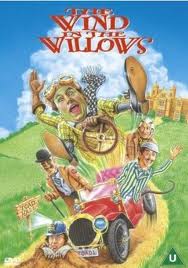
THE WIND IN THE WILLOWS
UK, 1996, 86 minutes, Colour.
Terry Jones, Eric idle, Idle, Steve Coogan, Nicol Williamson, Anthony Sher. John Cleese, Stephen Fry, Bernard Hill, Michale Palin, Nigel Planer.
Directed by Terry Jones.
They must have studied it at school (as many of us did in the good old days), because Terry Jones and the other Pythons have put a great deal of effort into this adaptation of Kenneth Grahame's classic of Toad, Ratty, Badger and the creatures who live near the river. But they have decided to go with human actors rather than with animation or the use of real animals. And it works.
With visual suggestions of the animals they portray like moustaches and hairstyles, Terry Jones becomes Toad, Nicol Williamson becomes Badger, Eric Idle becomes Ratty - and Anthony Sher becomes the most villainous of weasels. Some songs are added but most of the plot is there to offer an imaginative interpretation of a very popular story. At the end Toad is still incorrigible.
An affectionate interpretation of a classic.
1. The popularity of the novel? The familiarity of readers with the characters? The appeal to children? To adults?
2. The writing of Kenneth Grahame, his ability to create characters, creatures in themselves with their characteristics but also in the contemporary world?
3. The work of Terry Jones, the Monty Python group, their presence in this film, performance, comedy, songs? Terry Jones directing? Performing as Toad?
4. The screenplay, incorporating the characters, their adventures, Mole and the destruction of his house, his friendship with Ratty, Toad and Toad Hall? The cars? Toad and his irresponsibility? Reliance on Badger? The role of the evil weasels, especially the Chief?
5. The make up, the human actors, animal characteristics in look, voice? Toad and his green colour?
6. The performances, comic, pantomime for the animals? Pleasant exaggerations? The behaviour of the Chief? The songs and the musical interludes?
7. The focus on Mole, in his home, underground, the collapse and the destruction, his talking clock? His bewilderment? A timid character? The encounter with Ratty, the friendship, Ratty and the picnics, Toad and his cars and recklessness on the road, their being passengers and their being apprehensive? The decision to go to Badger for help? Mole and his being part of the group, lamenting the loss of his house, being lost in the woods with Ratty, the friendship of Badger and everyone offering him a home? The encounter with the weasels, in the Dog Food Factory, his attempts to help, getting his sleeves caught, throwing the spanner and saving the day? Getting a new home?
8. Toad, the focus of the story, his wealth, irresponsibility, Toad Hall? His recklessness? Getting the cars, driving badly, the crashes, the number of cars, the dealer and his six cars? And the plane at the end? Toad and his selling his home, allowing the weasels to take over, not worried about others, self-absorption? The deal with the weasels, their betraying him, his being held over the mincer, with the others? The confrontation with the Chief, the explosions? The lectures by Badger, incorrigible? Finally flying the plane?
9. Toad in court, the judge, the defence being more like the prosecutor?
10. The guest cameos, Michael Palin as the sun, Stephen Fry as the Judge, John Cleese as the lawyer…?
11. Ratty, the Eric Idle style, the look, schoolboy blazer, accent, love of picnics, on the river? Friendship with Mole, exasperation with Toad? Meeting with Badger, supporting him? In the finale, over the mincer, the song and dance routine?
12. Badger, old, wise, irascible, not afraid to rebuke Toad, using some physical violence? The advice, giving up on Toad? The mincer? The song and dance routine?
13. The weasels, their looking alike, make up, moustaches and glasses, upper-class manners and accents, the group? Their following the Chief, mischief, the reckless party, the birthday cake for the Chief? Their being attacked by Badger and co - and the mayhem and the melee of the fight?
14. The Chief, sinister, smug, his plans, treatment of his underlings, Toad and Toad Hall, his evil chuckle? The deal with Toad, betraying him, the Dog Food Factory, Toad and the mincer? His party, the exploding cake, his going to the factory, with the explosives, the challenge from Toad, Toad falling – and Ratty putting the explosives in the Factory instead of in the Hall?
15. The rabbits, subservient, the cooks…?
16. The entertaining plausibility of these animals in the English countryside, on the river, with their own homes and buildings and the threat by the weasels and the Factory?
Published in Movie Reviews
Published in
Movie Reviews
Tagged under
Saturday, 18 September 2021 19:50
Behind the Headlines
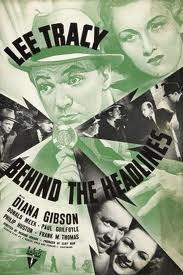
BEHIND THE HEADLINES
US, 1937, 58 minutes, Black and white.
Lee Tracy, Diana Gibson, Donald Meek, Paul Guilfoyle.
Directed by Richard Rosson.
Behind the Headlines is of interest, historically, rather than any major entertainment value.
It is a short second feature, very B-budget, stirring a popular actor of the time, Lee Tracy. One of the surprises of the film is the appearance of Donald Meek as a villain.
The plot involves the clash between instant radio reporting and the delay with the print media. Some of the dialogue is interesting in terms of 21st-century difficulties between online instant news and waiting for publication in newspapers, let alone radio and 24 hour television new services. There is also a reference to television in the screenplay.
Lee Tracy plays a reporter who is on the spot for all kinds of crises, connecting with his partner in a van for relays to the radio station. He rouses the ire of the print media, especially reporter, Mary Bradley (Diana Gibson) with whom he has had a romantic entanglement. She goes on air to pretend that Tracey is actually in the station rather than on the spot. There is continued sparring between the two in the 1930s screwball comedy vein.
The same happens in the reporting of fire where Tracy does some heroics in helping to rescue people.
By chance, the microphone is left in a room where a group of crooks plans the robbery of a gold consignment on its way to the newly established Fort Knox. Unfortunately, Tracy is not aware of the consignment and so is not on the ball. Mary Bradley, however, is after a scoop and goes to report the plan to a Treasury official. This makes things difficult for her since he is the mastermind of the robbery and takes her, hiding in a cave with the van and the bullion. She has stolen a radio transmitter from Tracy and now uses it to make contact, enabling the FBI to find out where the transmission is coming from, getting messages to her over the radio through Tracy because she has left her watch, given her by Tracy, on the highway and it has been discovered.
She flees into the armoured truck and the villain is trying to open it when the FBI arrive – and he is rather peremptorily shot.
The film ends with the jokey ending of Mary again pretending that Tracey is in the studio rather than on the spot.
It is interesting to look at the technology of 1937, radio, transmissions, the FBI and tracing the origins of radio broadcasts, the prospect of television, and the search for Mary with the use of a dirigible.
Published in Movie Reviews
Published in
Movie Reviews
Tagged under
Saturday, 18 September 2021 19:50
Cool Money
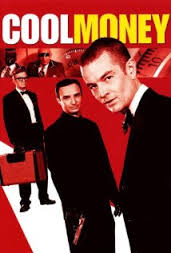
COOL MONEY
US, 2005, 89 minutes, Colour.
James Masters, John Cassini, Margot Kidder.
Directed by Gary Burns.
Cool Money is an easy watch, a television film about heists. The focus is on James Masters as Jack, who has spent half of his life in prison for petty robberies. He escapes from prison, steals a necklace from a jewellery shop and is arrested. However, he argues his case in court, has a glowing testimony from his mother, from a friend posing as a religious minister, and prepares a document that indicates that he has been penalised for more prison time than he deserved. He goes free, returns to his wife and child, reluctantly gets a job in the factory.
He is approached by a criminal, played by John Cassini, who has few social graces, is aggressively violent but has connections, especially for a series of robberies in the very expensive hotels in New York City. The group are successful with their robberies and the police set up a special squad, including an investigator who grew up with Jack.
It becomes a bit complicated when the criminal is found to be in connection with the Mafia and who then come demanding money from him. Jack is caught again but does not go to prison…
There is an amusing cameo by Margot Kidder as Jack’s quite flirtatious mother.
1. An entertaining television movie? Characters, situations, robberies, police pursuit?
2. The prison settings, the Florida settings, homes, city, factories? The contrast with New York City and the expensive hotels? The musical score?
3. The focus on Jack, his prison sentence, half his life in prison, his wife and child, escaping under the truck, going to the shop, his charm, the necklace and his stealing it, throwing it away when he was arrested? In court, the test and in his mother, his friend posing as a minister? Later getting him to recover the necklace? His explanation of his time served, the judge letting him go? His return home, his wife wanting him to stay home, his friend getting him the job in the factory? The approach of Sam, his manner, Jack agreeing to go, leaving the family? In New York, the first attempt at the Pierre Hotel and their being ejected? Sam and his aggression? The other attempts, dealing with the concierge, the Mexican band, the couple in the basement? The succeeding operations, their success, the collage of the headlines? Phil and his suspicions of Jack? Phil’s superior not taking enough notice? The Thanksgiving dinner, Jack’s mother hosting? Sam and his wanting another job done, Jack unwilling, doing it, the jewellery and cash, hiding it at home? Sam and his visit, the police arresting Jack? Going free again? His smooth and suave character?
4. Sam, rough, his connections, the plans, his treatment of the concierge, Jack having to control him? The success of the jobs? His return, agreeing to do
what Jack asked? The last big robbery? The Mafia, demanding money, his asking Jack, sitting in the car, watching the arrest?
5. The old friend, as a minister, in the court, getting the necklace, participating in the robberies? The other robbers called in?
6. Phil, friendship, the police, the squad, the leads, the superior and is not acknowledging Phil, Phil and his confrontations with Jack? The final arrest?
7. The amusing cameo of Margot Kidder, Peggy, flirting, love for her son, the Thanksgiving dinner, the visit of Sam, tea and cookies? And her final alleged lack of knowledge about the money?
Published in Movie Reviews
Published in
Movie Reviews
Tagged under
Saturday, 18 September 2021 19:50
Walesa: Man of Hope
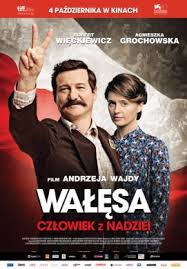
WALESA – MAN OF HOPE
Poland, 2013, 128 minutes, Colour.
Directed by Andrej Wajda.
There was a time, from the early 1980s and through that decade, that most people knew who Lech Walesa was and how the Solidarity Movement in Poland, starting on the waterfront of Gdansk, led to the downfall of the Polish government and offered an example to other Soviet countries of how, especially after the death of the Russian President, Leonid Brezhnev, the Soviet Union could never be the same. Then, in 1989, the Berlin Wall came down.
At the time, celebrated Polish director, Andrez Wajda, made a number of films that reflected the situations of the late 1970s, early 1980s. One of them was a fiction/semi-documentary, Man of Iron (1981), about Solidarity and how it was beginning its move against the government presiding over a failing Polish economy. It was also a society plagued by officialdom, bureaucracy, secret police and oppression of civil rights.
Wajda was in his mid-80s when he made this portrait of Walesa, his opportunity to go back to this period, not just to show it as it was, but with the benefit of 30 years of hindsight and almost a quarter of a century of freedoms. From this film, it is clear how admiring he is of Walesa of Solidarity and the changes in Poland.
Walesa is shown at the opening of the film being interviewed by famous Italian journalist, Oriana Fallaci. As the film keeps going back to the interview, it offers the screenplay the chance to ask significant questions as well as to show Walesa’s character. He would not have been an easy man to deal with, sometimes a stolid waterfront worker and union man, not a smiling man. Rather, he is determined, strong-minded, prepared to be jailed many times, to keep to his principles. We see him at home with his long-suffering and loving wife. We see him in discussions with the workers. We see him at demonstrations. We are told of his charisma – which does quite come across. Perhaps the English sub-titles do not do justice to his charisma.
Nevertheless, the film is of interest to find the Polish point of view on Walesa. Involved in disputes and strikes during the 1970s (and sacked from his job), he survives with mechanic’s work but finds that the 1980s are bringing to the surface the earlier uprisings of the 1970s. Authorities are exasperated by him and are out to get him. He is put to disadvantage personally and politically during the strikes and the consequent hardships of unemployment, loss of wages, hunger and the failing economy.
All the time there is the interest of John Paul II, elected in 1978, seen re-visiting Poland and supporting the goals of Solidarity. And his picture is on the wall of the Walesa household.
Ultimately, Solidarity prevails and we see footage of Walesa and his speech to the United Nations in 1989. He will soon become the President of Poland.
1. A Polish film, Polish history, Polish sensibility, the spirit of Poland?
2. The work of the director, many decades, his celebrated status in Poland? His films about communism and the collapse of communism?
3. Lech Walesa, in the 1970s and the 1980s, his leadership of the unions, of Solidarity, his ultimately becoming President of Poland? Nobel Prize?
4. Audience knowledge of Walesa, appreciation of him?
5. Polish history, the communist period, the emergence of the unions, of Solidarity, the fall of communism? Post-communist Poland?
6. The locations, the Polish atmosphere, the city of Gdansk, homes, the docks, offices? Workplaces? Government offices?
7. The film as a biopic, the opening interview, Oriana Fallacci, her status, the decision to come to Poland? The occasion for flashbacks, the cumulative effect? Seeing Walesa’s potential, his achievement?
8. Oriana Fallacci, her Italian background, her reputation, getting permissions? Walesa and his attitude? The tone of the interview? The effect of the flashbacks?
9. Lech Walesa, the film’s impression of him, as a man, his background, Polish, labour, his wife and children and his devotion, his Catholicism, home life, hard life, as an electrician, working on the docks, working with the men, the conditions, the unions? His stances? Election to leadership? The difficulties? The establishing of Solidarity? Political issues, his persecution, security, documents?
10. Work on the docks, the death of the young men and the effect?
11. Walesa, being followed, security concerns, the many arrests, imprisonments, the documents, his being fired?
12. 1980, the strike, his being consulted, the advice, entering into the strike, leadership, the harsh treatment? The role of the Polish President government? Imposing martial law? The consequences?
13. The role of the media, coming to the house, the meetings, Walesa and his caution – and sitting at home with his family watching Rich Man, Poor Man?
14. The tactics with Walesa, the imprisoned, the interrogations, the confinement, the releases?
15. His being awarded the Nobel prize, his wife going to accept it, her return, the humiliation of the strip search at the airport?
16. 1989, the elections, the fall of communism?
17. The role of John Paul II and Walesa’s contact with him, friendship?
18. Walesa becoming President of Poland, the surprise of his success? His achievement?
Published in Movie Reviews
Published in
Movie Reviews
Tagged under
Saturday, 18 September 2021 19:50
Sunshine on Leith
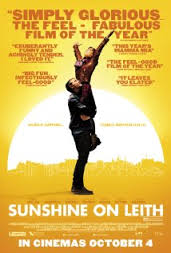
SUNSHINE ON LEITH
UK, 2013, 106 minutes, Colour.
Peter Mullan, Jane Horrocks, George Mac Kay, Kevin Guthrie.
Directed by Dexter Fletcher.
Do you know the group, The Proclaimers (since 1987)? If you do, and like their music, then you will be interested in seeing what has been done with their songs. As with Mamma Mia and the Abba songs, a fictitious story has been created, originally for the stage, and the songs inserted to highlight characters and their emotions, family crises and reconciliations.
If you do not know The Procalimers, you may have heard their popular song, I’m Gonna Be… 500 miles (which was used in Ken Loach’s The Angels Share). This gets the musical spectacle treatment as the finale. There album Sunshine on Leith is from 1988.
Response to this film will depend not only on the songs and their insertion into the plot, but also how characters suddenly beginning to sing in the middle of naturalistically filmed and realistic circumstances really works as cinema.
This reviewer did not respond really well to these devices in Mamma Mia, although the Abba songs are enjoyable in their way (and also part of our musical consciousness for decades). This time, apart from the climax, the songs were not so enjoyable, nor memorable, except that for a number of the songs consisted of repetitive, repetitive, lyrics, repeated frequently (to irritating effect). One of them, I’m getting over it, gets a repetitiously repetitive re-run during the final credits. Otherwise, the melodies were not engaging and some of the lyrics, especially in a song about Florida looking towards Canada are less than inspired or inspiring.
The setting is Scotland – and Edinburgh looks wonderful. Two soldiers return from service in Afghanistan, to a rather dreary civilian life, to some romance (with some heartbreaks) and a crisis that has nothing to do with them but with the parents of one of them (Peter Mullan and Jane Horrocks) and a marriage crisis.
Without the songs, this would be conventional enough. And, with the songs, it still remains conventional enough. But, that climax of 500 Miles with exuberant crowds and cast outside the National Gallery in Edinburgh has great vitality.
Probably best to check with someone who really liked it.
1. The Proclaimers and their songs, incorporated into a fictitious play, opened out for the screen?
2. Edinburgh, looking good and attractive, homes, workplaces, the hospital, pubs, the streets? The landmarks?
3. The songs, the melodies, the lyrics? Inserted into the action of the story? How credibly?
4. The opening in Afghanistan, sense of realism, the truck, the men, their singing, the threat of death at any time? The explosion?
5. The narrative, the sense of realism, naturalism? The contrast with the songs and their artificiality in this naturalistic setting? The insertion? How will did
they work? The characters, situations, emotions, tensions?
6. The basic plot, the men in war, the women at home, parents? The drama with the information about the unknown daughter, with Lizzie’s refusal of Ally’s proposal, David and Yvonne with their choices? How well would the film work as drama without the songs?
7. The songs, their impact within the context of the drama, revealing character, difficulties, crises, emotions?
8. Ally and Davey, coming home, their song in the Edinburgh Street – ah-ha? Going to their families, the joy of the men coming home, experiences of love?
9. Jobs contact, call centres? Hospitals? The pub and the songs? The young men and women gathering together, support, revelation of characters? The women and their work at the hospital?
10. Jean, working at the gallery, her girlfriends, Harry and his interventions? Confiding in the girls, the song and dance with Harry and the women?
11. Davey and his place in the family, with his parents, his sister? Meeting Yvonne at the pub? Going out together, moving in, happy, Yvonne’s challenge about him going to England with her, his answers and her being upset, leaving? His going to the hospital to find her, hurrying to the railway station, his mother’s advice about making the relationship work?
12. Rab, the father of the family, a good man, with Jean? Welcoming his son home? Receiving the unexpected letter, the news of his daughter, going to the funeral, the mass, talking with her, not going to the funeral itself? The 25 years? The celebration, everybody at the gathering, singing and dancing? Telling Jean, her reaction, justified? Her being upset, at home, his sleeping on the couch? His doing the shopping, his collapse? Jean and the advice of Harry and her friends? Her feeling hurt, talking about the issue, find the photo of Rab and the daughter’s mother? His collapse, going to the hospital, holding his hand, singing? His gripping her hand? His coming out of hospital, asking about the daughter, his saying that he would have to see her, Jean having asked her to be the driver? Reconciliation?
13. Ally, the preparation for his proposal, in the pub and the singing advice of the barman of how to propose? The solemn proposal, his speech, Lizzie and her refusal? Ally’s anger, the saying that he was her best pal, his being morose?
14. Ronnie, in rehabilitation, Davey going to see him, Ally not?
15. Ally, going to see Ronnie? Arguing with Davey, not wanting his help, enlisting? Seeing him singing on location in Afghanistan?
16. Lizzie, wanting to make choices, the world before her, the application for the nursing job in Florida, her choices? Her mother giving sensible advice?
Seeing her in Florida?
17. The big finale, moving into movie musical style, the crowds, the square outside the National Gallery, everybody singing 500 miles?
Published in Movie Reviews
Published in
Movie Reviews
Tagged under
Saturday, 18 September 2021 19:50
Awakening, The/ UK 2012
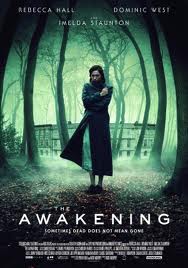
THE AWAKENING
UK, 2012, 107 minutes, Colour.
Rebecca Hall, Dominic West, Imelda Staunton, Joseph Mawle. Shaun Dooley, Isaac Hempstead- Wright, John Shrapnel.
Directed by Nick Murphy
When there is a story about children and ghosts, many think about Henry James’s classic The turn Of the Screw and Jack clayton’s very effective film version, The Innocents.
However, this film resembles ghost story of 1995, The Haunted, with Aidan Quinn as an exposer of fakes, involved in an encounter with a family, a governess who sees a ghost, and he himself experiences ghostly sightings. Audiences familiar with The Others will not be surprised.
1. The popularity of ghost stories? In the English setting? The 1920s? Beliefs at the time?
2. The British setting, the location photography, the school, the grounds? The re- creation of period? Costumes and decor? Musical score?
3. The title, the ghost, the ambiguity, the twist?
4. The situation, Florence and her scepticism, the request to go to the school, the visit, the staff, the students, the ghost, the effect on Florence?
5. The character of Florence, a woman of the 20s, the death of her lover in World War I, her scepticism, interest in hoaxes? Her role as a ghost hunter? Exposing fakes?
6. Robert Mallory, his war experience, teaching, his concern about the ghosts, the student dying, Maude and the staff? His request of Florence? The inevitable attraction towards each other?
7. Maude, her place at the school, her character, protective, the boys, the ghosts? Florence and her suspicions?
8. The boy and his fear, the ghost? The apparition?
9. Mc Nair, his role of the school, his role in the apparitions?
10. Florence and the cameras, Mallory’s succession of photos, the presence of the ghost? Florence and her setting up cameras throughout the house? And her own visions? The child? Dropping the lighter into the pond, the memories of her lover, killed in the war, her going into the pond, Mallory, the rescue?
11. The school empty, the holidays, Florence and Mallory and their sexual encounter? You line, Judd, the groundsman, his character, his attack on Florence, Mallory beating him?
12. The role of the music box, Florence's memories, realisation that Tom was actually a ghost, visible to herself, to Maude, his being Maude’ son, Florence’s half brother? The memories of her father, his attack, killing Tom and Florence’s mother?
13. Maude, wanting to be united with her son, the sherry, the poison, her death? Florence drinking the poison? Mallory saving her?
14. How effective as a ghost story?
Published in Movie Reviews
Published in
Movie Reviews
Tagged under
Saturday, 18 September 2021 19:50
Stars in my Crown
STARS IN MY CROWN
US, 1950, 85 minutes, Black and white.
Joel Mc Rea, Ellen Drew, Dean Stockwell, James Mitchell, Alan Hale, Connie Gilchrist, Juano Fernandez, Ed Begley.
Directed by Jacques Tourneur.
Stars in my Crown is what might be called a peaceful western, with religious overtones. It is the story of a peaceful town, the story of the parson, his wife and his wife’s nephew, With the star turn by Joel Mc Rea, actor in so many genres specialising in Westerns. By this time, Dean Stockwell had established himself as one of the best child actors in Hollywood. The film has several character actors in support, especially Alan Hale and ed Begley in a typical bullying role, and James Mitchell as the local doctor, son of Lewis Stone. The film was directed by Jacques Tourneur, who had began his career with the number of horror films for Val Lewton.
The title is the name of a very popular religious hymn in the 19th century.
1. The title? Evocation? United States? Religious? Old time religion?
2. MGM production values, black-and-white photography, the old American town, after the Civil War? The church, the store, the parsonage, farms?
3. The narrative, the older John, his tone, confiding in the audience?
4. The parson, arriving, going to the saloon, the guns, preaching, everyone’s reaction, preaching everywhere in homes at other places, his popularity, Harriet admiring him, marrying her, the parsonage, John as Harriet nephew, the building of the church?
5. The people of the town, Jed and his working with the parson during the Civil Walk, his range of sons, not going to church, his wife cooking? The old doctor and his popularity in the town? His son arriving, the teacher, the children, classes? Backett, Uncle Famous, the mining men, the ladies of the church?
6. The church, the services, the preaching, the singing of the hymns, the parson
disputing his wife’s choices of the hymns?
7. The doctor, chatting with the parson, smoking his pipe, dying? His son, non-religious, hard in his attitude, trading comments with the parson, his meeting with Faith, courting, the day out, returning at his father’s dying? Sadness, the funeral? His proposal to Faith, wanting her to leave everything and leave with him? The typhoid, John as victim, his collapse after the magic show, getting better, the many getting sick in town, the deaths, Faith and her illness, people not trusting the doctor, the woman and her injured wrist and saying it would be all right? The parson coming to pray for Faith? recovery? The mellowing of the doctor?
8. John, his age, energy, at home in the parsonage, imitating the parson, fishing with Uncle Famous, going fishing, his friendship with Jed’s boy, Professor Jones coming to town, the magic, trying to sell the parson, everyone coming, John chosen for the tricks, drinking from the well, the typhoid, the long illness, recovery, the truth about the well, settling down?
9. Backett, the land, the store, the mine? Offers to Uncle Famous,, the refusal, the next offer, Famous not wanting to be rich, owning the land, the destruction of crops, the freedom for the African-Americans? The visit of the Ku Klux Klan? The parson, his challenging the men at the store, going to the house, the Klan, the rope, the parson’s speech and nominating all that the men had received from Uncle Famous, his will? The men leaving? John and his being present, the blank pages?
10. Themes of racism after the Civil War?
11. Life going back to normal in the town, the church? Pleasing story, and a different west?
US, 1950, 85 minutes, Black and white.
Joel Mc Rea, Ellen Drew, Dean Stockwell, James Mitchell, Alan Hale, Connie Gilchrist, Juano Fernandez, Ed Begley.
Directed by Jacques Tourneur.
Stars in my Crown is what might be called a peaceful western, with religious overtones. It is the story of a peaceful town, the story of the parson, his wife and his wife’s nephew, With the star turn by Joel Mc Rea, actor in so many genres specialising in Westerns. By this time, Dean Stockwell had established himself as one of the best child actors in Hollywood. The film has several character actors in support, especially Alan Hale and ed Begley in a typical bullying role, and James Mitchell as the local doctor, son of Lewis Stone. The film was directed by Jacques Tourneur, who had began his career with the number of horror films for Val Lewton.
The title is the name of a very popular religious hymn in the 19th century.
1. The title? Evocation? United States? Religious? Old time religion?
2. MGM production values, black-and-white photography, the old American town, after the Civil War? The church, the store, the parsonage, farms?
3. The narrative, the older John, his tone, confiding in the audience?
4. The parson, arriving, going to the saloon, the guns, preaching, everyone’s reaction, preaching everywhere in homes at other places, his popularity, Harriet admiring him, marrying her, the parsonage, John as Harriet nephew, the building of the church?
5. The people of the town, Jed and his working with the parson during the Civil Walk, his range of sons, not going to church, his wife cooking? The old doctor and his popularity in the town? His son arriving, the teacher, the children, classes? Backett, Uncle Famous, the mining men, the ladies of the church?
6. The church, the services, the preaching, the singing of the hymns, the parson
disputing his wife’s choices of the hymns?
7. The doctor, chatting with the parson, smoking his pipe, dying? His son, non-religious, hard in his attitude, trading comments with the parson, his meeting with Faith, courting, the day out, returning at his father’s dying? Sadness, the funeral? His proposal to Faith, wanting her to leave everything and leave with him? The typhoid, John as victim, his collapse after the magic show, getting better, the many getting sick in town, the deaths, Faith and her illness, people not trusting the doctor, the woman and her injured wrist and saying it would be all right? The parson coming to pray for Faith? recovery? The mellowing of the doctor?
8. John, his age, energy, at home in the parsonage, imitating the parson, fishing with Uncle Famous, going fishing, his friendship with Jed’s boy, Professor Jones coming to town, the magic, trying to sell the parson, everyone coming, John chosen for the tricks, drinking from the well, the typhoid, the long illness, recovery, the truth about the well, settling down?
9. Backett, the land, the store, the mine? Offers to Uncle Famous,, the refusal, the next offer, Famous not wanting to be rich, owning the land, the destruction of crops, the freedom for the African-Americans? The visit of the Ku Klux Klan? The parson, his challenging the men at the store, going to the house, the Klan, the rope, the parson’s speech and nominating all that the men had received from Uncle Famous, his will? The men leaving? John and his being present, the blank pages?
10. Themes of racism after the Civil War?
11. Life going back to normal in the town, the church? Pleasing story, and a different west?
Published in Movie Reviews
Published in
Movie Reviews
Tagged under